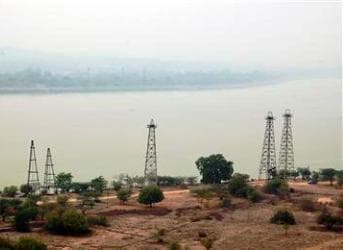Welcome to Myanmar, formerly Burma. A gateway to the Indian Ocean for China and the home of massive oil and gas wealth that is an important element of America’s Asia policy and China’s energy policy. It is also run by a brutal military junta (renamed), is rife with sectarian violence, and has just seen an entire community burned to the ground at a key hub of Chinese operations.
Some might say Myanmar is no longer a military junta. But here we remind you that the new “reformist” government is led by President Thein Sein, who also enjoyed the “prime ministerial” post under the military junta. It’s all just been repackaged.
Myanmar remains dominated in every respect by the ethnic Burmese (only the urban ones, of course), despite the fact that ethnic minorities comprise half of the country’s population. Precariously, and very inconveniently for the government, these sidelined minorities are situated in border regions, in areas that are home to the lion’s share of fossil fuels reserves, and along international trade routes.
The government’s answer seems to be just to get rid of this half of the population. The minorities’ response to this gesture is to form their own militias to fight back. For years, the focus of the Western media has been on “pro-democracy” figurehead Aung San Suu Kyi, who was cut out of various elections and placed under house arrest. But no one really bothered to examine exactly who Suu Kyi is: an elite ethnic Burmese. It was enough to hear the phrase “democracy” attached to her and “house arrest” to conclude that she was the answer to Myanmar’s military junta problems. Plus, she won the Nobel Peace Prize.
While everyone likes to think Myanmar now has a democracy, what it has is an army that operates beyond any civilian control and launches offensives against minority areas in an attempt to clear the path for oil and gas development and free up international trade routes. Indeed, the military gets an automatic 25% of seats in parliament (very democratic).
At present, one focal point of these offensives is in the country’s north, home to the Kachin minority—and also an area that China is eyeing for oil and uranium exploitation and a hydro-power plant, Myitsone Dam. What does the prestigious Nobel Peace Prize winner have to say about all of this? Nothing.
At the same time, ethnic violence in spreading in western Myanmar, with sectarian violence between two rival ethnic groups—the Rakhine and Rohingya—leaving more than 80 dead and 22,000 displaced. During this melee, an entire Rohingya village was raised (some 2,220 homes), as evidenced by satellite images released by Human Rights Watch.
The village, home to the Rohingya minority (who number about 800,000 in Myanmar), is (was) situated in the Bay of Bengal. It was also the operational hub for billion-dollar Chinese oil, gas and pipeline investments. In this area, Daewoo International has won offshore gas concessions, China National Petroleum Corporation (CNPC) has oil concession, and is constructing two pipelines to southwest China, one carry gas, the other oil.
Myanmar is a key to China’s energy policy. Over 80% of China’s oil (10 million bpd) must traverse the Straits of Malacca between Indonesia and Malaysia, vulnerable to both piracy and geopolitics. China’s planned pipelines from Myanmar will allow it an alternative route that could supply up to 20% of its oil and gas needs.
The US response to Myanmar’s repackaged junta was to lift economic sanctions and let the investment poor in. This, of course, is directly related to the fact that the US does not wish to see China gain more of a foothold in this strategic location than it already has. (Like in Africa, the US has been slow off the starting blocks, allowing China to gain major control over natural resources, unmoved as it is by human rights issues).
This will not end well, however. Elections in Myanmar are scheduled for 2015, and until then, sectarian violence looks set to swell and the government will rush to the finish line to clear its strategic areas of its ethnic hindrances to exploitation and trade. Minority groups will rise up with new militias, with renewed vigor.
By. Charles Kennedy


















